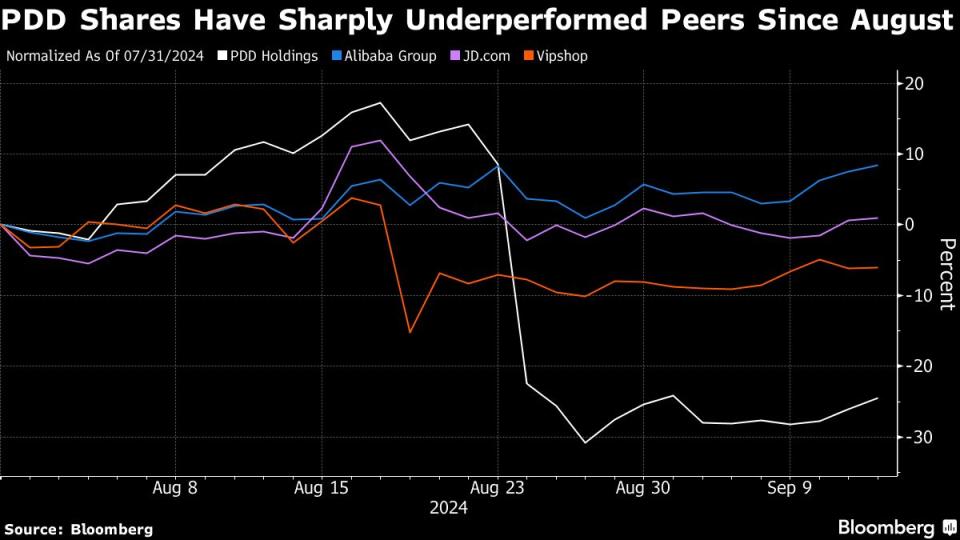PDD’s Status as Top China Growth Stock in Doubt After 30% Drop
(Bloomberg) -- PDD Holdings Inc.’s position as China’s top-performing tech stock is in danger, amid a crisis of investor confidence over the e-commerce firm’s worse-than-expected sales and growing competitive threats.
Most Read from Bloomberg
Housing’s Worst Crisis in Decades Reverberates Through 2024 Race
An Affordable Nomadic Home Design Struggles to Adapt to Urban Life
The Hague Is World’s First City to Ban Oil and Air Travel Ads
The company behind the popular Temu platform and its Chinese equivalent Pinduoduo has seen its US-listed shares slide more than 30% since results that disappointed the market last month. That’s the worst performance on the Nasdaq 100 Index, and the pain seems far from over as analysts slash expectations for the former market darling.
PDD’s weak outlook and lack of shareholder returns have raised concerns. Meanwhile rivals including Alibaba Group Holding Ltd. are showing success in matching the company’s cutthroat pricing, and heated US rhetoric continues to build over the Chinese business model.
On Friday, PDD’s shares dropped as much as 6.3% in US trading after the Biden administration announced steps to limit use of a trade loophole favored by Chinese retailers that allows millions of packages with cheap goods into the US every day without customs declarations or duties.
In the August earnings briefing, management was “guiding for lower growth and lower margins in the long term,” while also saying they need to spend more to defend market share, said Chelsey Tam, an analyst at Morningstar Inc. “They’re saying competition is intense,” she said.
Until recently, PDD had been seen as a rare bright spot in China e-commerce, as its low-price strategy enabled Pinduoduo to grab share among consumers looking for value in a weakening economy. It also reaped praise by duplicating that success overseas with Temu. PDD’s shares are still up more than 160% over the past five years, topping a Bloomberg gauge of the largest Chinese tech stocks.
That’s changed with the company’s warning that revenue growth will inevitably dwindle. PDD has shed more than $80 billion in market value from a high in May, falling back behind Alibaba as China’s largest e-commerce firm. In the process, PDD founder Colin Huang lost his briefly-held position as the nation’s richest person.
“The market has quickly become concerned that the hyper-growth phase for PDD could be coming to an end,” said James Kenney, senior investment manager at Pictet Asset Management. “The domestic macro headwinds and an increasing competitive landscape are both likely to moderate this strong growth in the shorter term.”
Amazon.com Inc.’s plans for a discount section and recent offerings from others including TikTok owner ByteDance Ltd. are crowding PDD’s mainstay low-cost market. At the same time, geopolitical risks are rising as the US trains a spotlight on forced labor and retailers that skirt import duties with high volumes of small shipments.
“More than 50% of Temu’s products are currently sourced from China,” so increased scrutiny may hurt PDD’s margins, said Bloomberg Intelligence analyst Catherine Lim. She added however that “in terms of price competitiveness, I am less concerned on this front as rivals such as AliExpress and Amazon also source a similar portion from China.”
PDD’s consensus stock price target has been slashed 24% since its results in August, more than any other Chinese company except Gaotu Techedu Inc., according to data compiled by Bloomberg. Analysts were discouraged by the online retailer’s unclear guidance as well as the absence of plans to buy back shares or pay any dividends, even as rivals plan record levels of shareholder returns.
“All investors we spoke to were puzzled by PDD’s guidance and areas of investment,” JPMorgan Chase & Co. analyst Andre Chang wrote in a note. Long-only funds in particular “are disappointed by the company’s apparent neglect of shareholder value, given PDD’s guidance that it will not consider shareholder return actions in the visible future.”
Top Tech Stories
OpenAI is releasing a new artificial intelligence model known internally as “Strawberry” that can perform some human-like reasoning tasks, as it looks to stay at the top of a crowded market of rivals.
Oracle Corp. said annual revenue will rise to at least $104 billion in fiscal 2029, an optimistic signal on the growth prospects of the software maker’s cloud infrastructure business.
Adobe Inc. shares dropped after the company delivered an outlook that failed to quell investor impatience for new artificial intelligence tools to start generating cash.
--With assistance from Jeran Wittenstein.
(Adds details of Biden’s trade plan in fourth paragraph, updates stock moves throughout.)
Most Read from Bloomberg Businessweek
College Football Players Learn an Ugly Truth About Getting Paid
China Can Avoid Japan’s Lost Decades If It Follows Korea’s Path
EV Leases Go as Low as $20 a Month to Help Dealers Clear Their Lots
The Vegas Sphere’s First Live Sporting Event Will Be an Expensive One
©2024 Bloomberg L.P.



